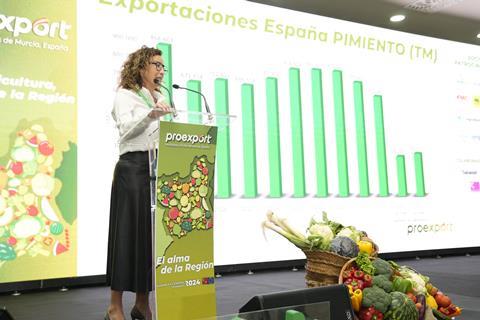Favourable weather and R&D investments boost production and quality in 2024
The Region of Murcia enjoyed a strong pepper campaign this year, thanks to good weather and ongoing investments in research and development, according to Proexport.

Eva Pérez, president of the association’s pepper division, said the investments made by private companies and cooperatives in recent decades had yielded positive results in terms of both volume and quality.
“This year the weather conditions have been very favourable in our area. We have had very good temperatures, without excessive heat, which led to flowering taking place in optimal conditions. This resulted in a very high-quality product, above that of the Netherlands (our main competitor) and, in addition, with a very satisfactory production of kilos per hectare”, she said.
The Region of Murcia is the second largest pepper producing area in Spain after Almería, with an annual production of 200,000 tonnes, grown on an area of 1,745ha. This includes more than 1,400ha of greenhouse production, of which 352ha is organic crops.
“Although the climate has played in our favour, the determining factor in the success of this campaign has been the important commitment that the sector has made in recent years to invest in new technologies and R&D&I, from the field to the table,” Pérez noted.
She highlighted investments in multi-tunnel greenhouses (taller than traditional ones), with windows for automatic ventilation, thermal screens designed to prevent the sun’s rays from directly affecting the plant; hydroponic cultivation, which is more efficient in terms of water and nutrient usage; integrated pest control, which is used for 100 per cent of greenhouse crops; water oxygenation equipment, which helps to make the water cleaner, and improves the yield and quality of the product. There are also devices installed inside greenhouses that use ultraviolet light to capture pests that may appear.
Pérez said the entire sector is working to further improve the climatic conditions in greenhouses, pest control and, the efficient use of water. But she noted that the banning of certain phytosanitary products, which are permitted in other countries, requires Murcian producers to rely on other techniques such as solarization, which forces an early end to the season.



